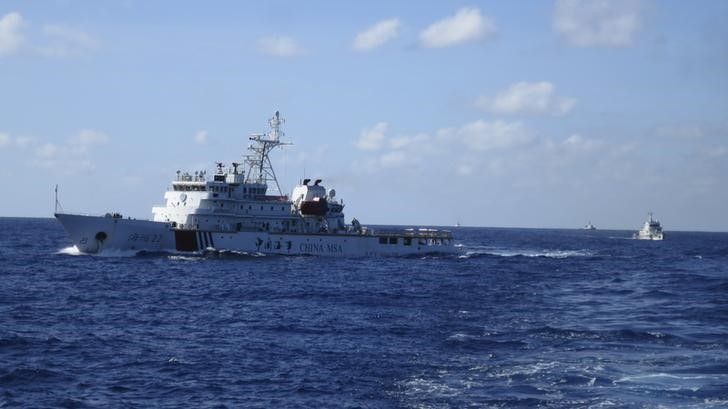South China Sea: With Russia On Its Side, China Tests The Sovereignty Of Vietnam Waters
China won't let a crisis go wasted. With the world preoccupied with the Russia-Ukraine war, Beijing is stepping up its campaign to dominate the South China Sea. This time around, by carrying out military drills in the South China Sea between the southern province of Hainan and Vietnam, testing Hanoi's sovereignty in this area.
For years, Vietnam had a shrewd strategy to protect its sovereignty from China's aggression. It teamed up with a world power Beijing wouldn't challenge: Russia.
But with sanctions against Russia bringing Moscow and Beijing closer to each other, this strategy won't work this time around.
China thinks of the South China Sea as its sea, and it has been doing whatever it takes to assert its sovereignty over a vast water area. Like the building of artificial islands, in violation of international tribunal rulings, including one favoring the Philippines. And like intimidating its neighbors by sailing its vessels in disputed waters and performing military drills.
While the Philippines President Rodrigo Duterte didn't dare to enforce the international tribunal ruling and try to stop Beijing, Vietnam - which also claims parts of the South China Sea - did in a couple of ways.

In the beginning, Vietnam tried to stop China bravely, deploying its forces to confront Chinese vessels that violated its sovereign rights.
Hanoi pushed for an agreement that will outlaw many of China's ongoing activities in the South China Sea, like construction of artificial islands, blockades, deployment of offensive weaponry like missiles and a conduct code China initiated back in 2013 called the "Air Defense Identification Zone."
But these efforts didn't seem to be effective. So, Vietnam upped the game by drilling for oil in sea areas delineated by China's "nine-dash line." That's a vague self-defined borderline in which Beijing claims virtually all of the sea.
This strategy didn't work either.
The problem was that Hanoi teamed up with weak partners for its drilling operations, like the Indian oil company ONGC Videsh and the Spanish Repsol. Both partners had to abandon their partnership with Hanoi after pressure from Beijing.
Eventually, Vietnam got its strategy right in fighting Beijing by picking up the Russian oil giant Rosneft, which the Russian government controls. That was a game-changer, as Beijing wouldn't risk a confrontation with the Russian navy, ready to defend the interests of Moscow in the region.
But with the Russia-Ukraine war bringing Moscow and China close to each other, this strategy may no longer be effective. Thus, Beijing's renewed resolve to test the sovereignty of Vietnam's waters, and advance its mission to turn the South China Sea into its sea.
© Copyright IBTimes 2024. All rights reserved.






















